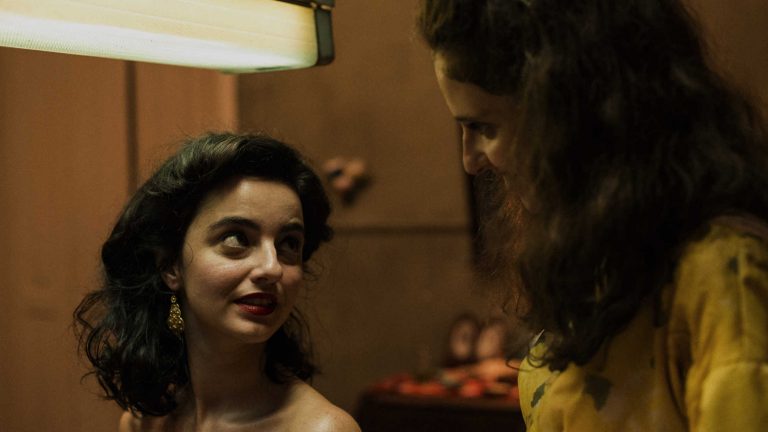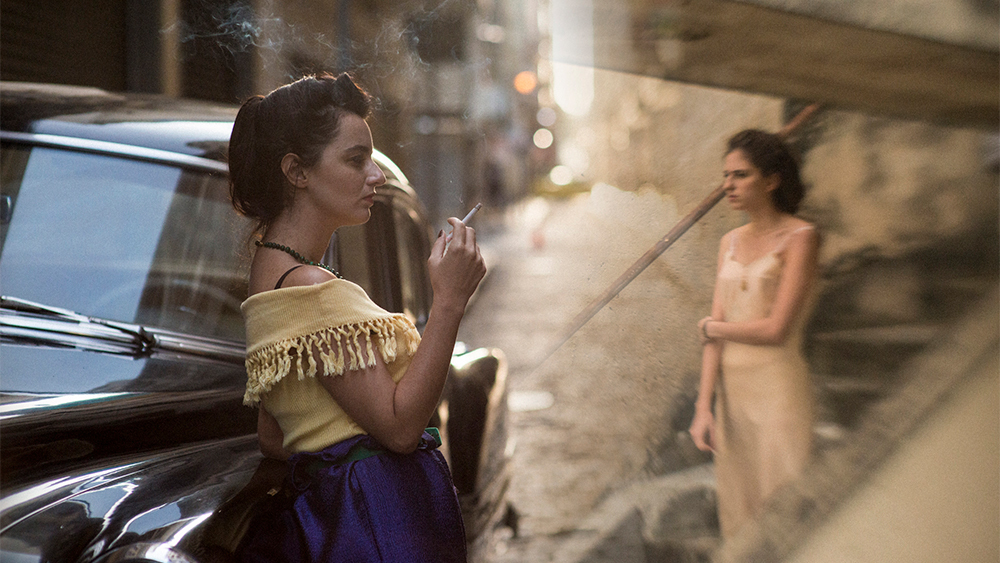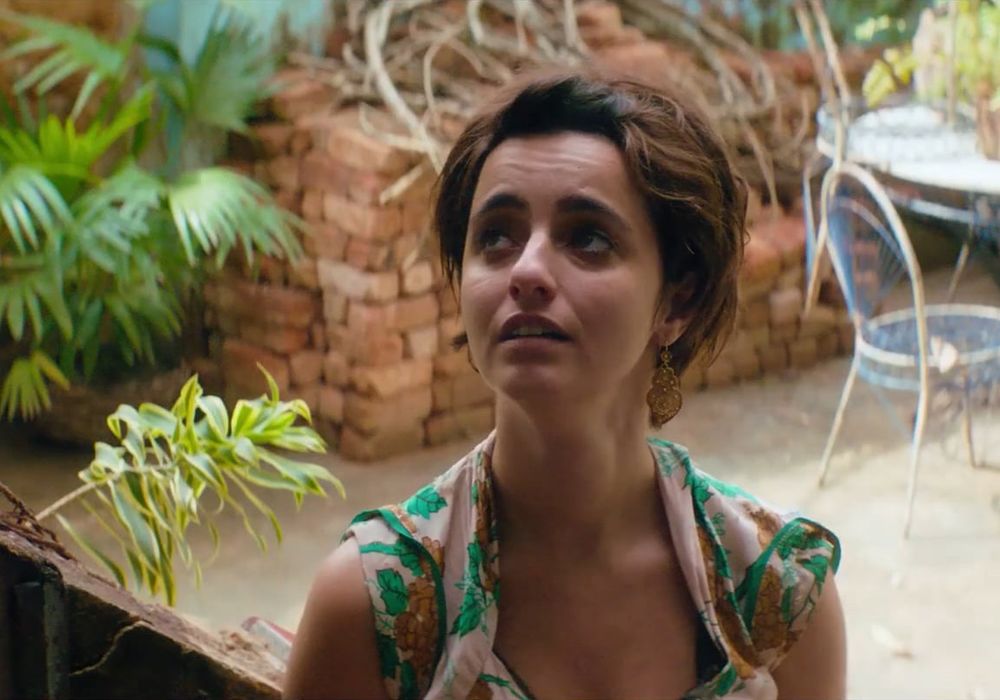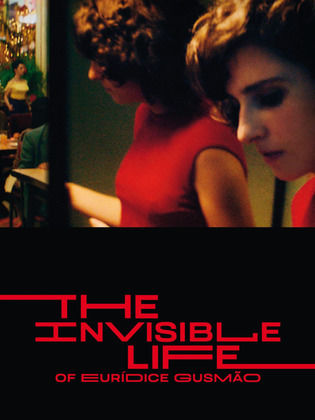Interview: Karim Aïnouz on 'Invisible Life' and why he chose to make a melodrama
 Friday, December 20, 2019 at 9:59AM
Friday, December 20, 2019 at 9:59AM With a depth of feeling and lush gorgeous colors that knock the wind out of you, Invisible Life is melodrama done right. Set in Rio de Janeiro in 1950 as two inseparable sisters have different dreams. One, Euridice played by Carol Duarte, wants to become a renowned pianist. The romantic Guida (Julia Stockler) yearns for true love. They are separated by their father and forced to live apart. They take control of their separate destinies, while never giving up hope of finding each other. We follow their story with ache in our hearts but with our eyes feasting on the beauty that fills the frame.
We got a chance to speak with director Karim Aïnouz recently in New York. [This interview was edited and condensed for clarity.]
Murtada Elfadl: Congratulations. The film is amazing.
Karim Aïnouz: Thank you. Thank you. That's good to hear
One of the things that I really love about it I grew up on Egyptian movies, which are very melodramatic.
Are you Egyptian?
I'm Sudanese.
Okay, let's go. Yeah. Okay.
So this reminded me of all the movies that I loved growing up. It's very lush.The emotions are very big. It's about family, it's about women. So I wanted to ask you about that first. Melodrama is not that respected these days. Were you afraid or concerned to make a melodrama?

It's like that for me too, I was raised on melodrama. I was raised bathing in melodrama because that's the genre root of Brazilian soap operas, radio soap operas and novellas in the 50s and then that sort of led onto the soap operas of the 70s when I was growing up...
So it's something that I was very familiar with. In those times they were much more interesting than the ones today because actors and directors were coming to radio from movies and theater. I was interested also in reaching a larger audience. And I think it's a genre that we're so familiar with that I thought it would be interesting to bet on it.
But yes it's a risky genre because it's always looked upon as a sub-genre. When you look at certain cultures, melodrama is the biggest gesture we can make. It's interesting you're talking about Egyptian melodrama. There's Mexican melodrama. Melodrama from different parts of the world. It's funny that it is thought of as an American genre, but actually there are declinations of melodrama that are very specific to certain cultures. There is German melodrama with Fassbinder. There is Spanish melodrama, there's Sirk. It was something that I've always wanted to do, but I never really had the guts to do it. On the other hand, I thought when I started to study it in a more theoretical way, I found that it is an interesting genre to use to talk about moments of crisis. It's not an accident that it's a genre that used to to tell stories of peripheral communities such as women, LGBT, queer people. It's interesting to talk about race through melodrama. So I think for me it seemed as a way to reach an audience without being politically frontal, while being viscerally engaging, which I think is what melodrama does. It catches you from an angle, which you don't really expect. From your liver, from your heart, from your stomach.

What was the inspiration?
The question for me was how can I take that genre and make it contemporary. I think the problem with melodrama is that people tend to quote it and I think it's important to not quote it, but appropriate it in a way that makes sense and that feels specific. I used the word tropical melodrama, it's an idea I had at the end of the editing process. How do I look at this and make it fresh? How do I turn this around? So these are the questions. There was fear but these are the questions that I dealt with. I thought it was an interesting political strategy to talk about the patriarchy. And I think one of my biggest inspirations is Imitation of Life, which is one of my favorite films, and I think it's highly political film. Or Ali Fear Eats the Soul, which I think is a super political film about migration, but from a very unexpected angle. I was trying to think of melodrama as a possible political strategy to talk about things that are relevant in the world today.
I was not sure if it was going to work because it is a genre that works on a key of excess. In the emotions, in the performances, in the gestures, in the colors, in the light, in the music, in the sound. So, it seemed to me like a good challenge. I live in Germany and I've been told that filmmaking is about precision, about knowing what you want. And I'm not precise. I'm a little bit of a mess and I think it's good to embrace that. So with this film, I embraced the messiness of what we are. I come from two different cultures. My father's Algerian, my mother's Brazilian, so there's a messiness in my upbringing and in my life, I think it's so good to be able to embrace it. And melodrama allowed me to do that.
One of the things that you said is you wanted to make it contemporary. What did you add to this melodrama to make it contemporary?
I've thought a lot about that. It should be physical, there's something about the experience of these two characters because I'm a man looking at female subjectivity and female experience. I thought it would very important that we look at women as really strong beings. That has to do with the physicality. They have to give birth, nurse a child, the physicality it takes to resist men. How can I do a melodrama of fluids? Tears and milk and sweat.
Sex.
And sex. For me that was very important to sort of look at it from that perspective. I also felt that every time I looked at melodrama with the exception of Fassbinder, there's a certain prudence to do with the body. And I thought, why? Because we look at it through the lens of the past. It's 2019 if I'm doing a film, which is really about intimacy and a family story, why can't I go into the bedroom with someone and be with them? When we were prepping the film, my costume designer said the actresses and actors are wearing too much underwear. I said in the 1950s people wore underwear at home because it was hot, there was no air conditioning. And so for example, the bodies of the actors are contemporary bodies. They are not from the 50s. The way they move, the language they speak is contemporary. It was very clear that the film didn't need to have very specific 1950s language. So we are contaminating the story with contemporary elements. This is more of a sensorial melodrama than a psychological melodrama or a moral melodrama.
Can you elaborate on that?
The relationship you have with the characters is through physicality. Of course plot is there, of course, the story is there. But I think it's really about connecting to the characters. It's not just empathy, it's being with them on a very intimate level. It was interesting for me too to do a melodrama where it's about the love between two sisters and it's not about a man and a woman. The clothes that they wear are not from the 1950s but it's okay. What I would love is that in 2030 you look at this film that is about the fifties but you know it was shot in 2019. And finally I wanted it to be very local, for that I wanted people to be sweating because in Rio is super humid. I wanted to have the jungle in it because it's a city that's built within a forest. It's unabashedly assuming a point of view from now.
I think you've already answered my next question. I was just struck by how messy the bodies are in this film during sex, during giving birth. Nothing was clean, nothing was as you see it in the movie, it felt very real because nobody has choreographed sex.
Right.
We all have messy sex.
Yeah. Of course, when it's good. [Both laugh]
It's an intimate chronicle, an intimate family saga. I think the way a human being eats, the way that a human being dances and the way a human being has sex. It's very telling of who they are. These characters that are in the film, they are 80, 90 years old. I wanted to trace how they lived through their intimacy and not from the outside.

The look of the film, such lush vibrant colors?
It's like when you have a scene where somebody has to tell a very sad story, but you ask them to tell it smiling. There is something about subtext that is quite intriguing. Melodrama can become very obvious when there's no subtext. The same thing can happen with the film and in the film language and the visual grammar that we use. I was watching The Piano Teacher from Haneke -- did you see that with Isabelle Huppert?
Yes.
I wanted to talk about things and an experience that was very cruel that those two characters had, but you can look at it from another angle. To shoot that cruelty, but to create an environment which is highly lush, so there's a contradiction there, an aesthetic operation that would make more sense. These women are constantly trying to have dignity. They're constantly trying not to cry. Somehow I translated that sensation of, you're gonna treat me badly, but I will resist and I will show you my dignity. And I think that is in the sound, in the colors.
Because the colors are so beautiful, I felt the love between them. The connection between the sisters, even though they're for most of the film separated.
You could also make an argument that those are imagined lives. How Guida imagines Euridice’s life and vice versa. So for that, I thought it was important that it had this sort of outward quality, which is not realistic.
They're separated for the whole film. So I was curious about what order did you shoot? Did you see them as two separate stories or as one?
No, it was important that it was the same story. There was about five weeks of shooting and I think they were together only during the first week and then they were never on the set together again. But before the shoot, before the film started, we did rehearse scenes in situations of them together. I think about a month and a half where they saw each other every day and they rehearsed scenes every day. They imagined things that happened between the sisters before this story kicked in. For example, there's a scene in the beginning where they're together and Guida tells Euridice about her boyfriend and how much fun it was to be touched by him. We rehearsed a scene where they teach each other how to masturbate so that memory is with them when they perform the other scene that's in the movie. So there was almost a whole film that we didn't shoot but just rehearsed so when they started the film, these two women that had spent so much time together had to be completely apart.

You've talked about working with the actors and your rehearsals. I was especially struck by Julia Stockler who played Guida. I thought her performance is so beautiful. It felt like something that I've seen from Anna Magnani, but also very modern. Can you talk about your collaboration with her and that performance?
Julia is interesting. When we did the auditions for Guida, there was one part that was just to look at the camera for three minutes. The camera is fixed, you look at it and then I see if I'm interested in looking at you. It's just basically how they used to do auditions in the 30s, 40s and 50s. The rules were you don't do anything, you don't need to perform anything. And she started smoking a cigarette in the middle of this. She was the only actress that did that. I'm like, Oh, that's interesting. That's misbehaving. So I was interested in her disquiet. There was something about being quite free in the way that she took the rules of the game. And that was very intriguing. For example, when she comes to see her father and she starts laughing. She's feeling the opposite. She's super afraid. And so she puts out something else. With Julia there was always a certain degree of spontaneity and excitement. She's high voltage. For me the worst thing for directors is when you propose the situation and the actors do it and then they come back to you asking but why? I think Julia is a real talent because it's not about analyzing, it's about experimenting and being present. And I think that's what was really fascinating about her.
She's just so wonderful. One last question for you. When the movie ended, the whole screening including me was in tears. But also the feeling that it left with me is fuck the patriarchy! Yes, I was devastated, but also I just wanted to hit something. Was that your intention?
Oh yeah. Oh yeah. Sometimes the movie ends and people say everybody was crying and stuff. Okay. But then what? It's legitimate to cry because it's just so cruel and it's cruel in a way, which is why do you screw somebody's life for the sake of keeping a family together? And for these ideas of tradition. So I think it's not a cruel story just a cruel reality. For example, the honeymoon there's no honey there. It's just bitter moon. And I think it's always looked upon from the standpoint of the patriarchy's perspective as a honeymoon, but it's not. And it's not because I'm showing how hard it is that it's hard. It's hard because that's the reality. So I think it's super interesting that it affects you somewhere and then you have this reaction. A lot of what I've been getting from the female spectators is that they open up and they want to tell their stories because these stories have been silenced. They have been not worthy of telling. They have been secret. The film unveils and creates the possibility of sharing their stories. And I've heard a lot of stories after this movie ends.
Wow. Oh, I think that's great.
Great. But also this sensation you are feeling is an awareness of things that are happening. The patriarchy somehow naturalizes everything, right? It makes everything natural. It's not natural. It's a system that entails certain kinds of behavior.
And with the men I think it's really interesting. It's either they are really troubled and it allows them to sort of look back at their own behavior, into their own experiences. Or sometimes the questions I get are like how was the camera work and how is it like being nominated to represent Brazil with the Oscars and blah, blah, blah. So it's super interesting. But what you say is exactly why I wanted to make a melodrama. Because it creates a sense of anger and a sense of this is not going to keep going like this and I'm going to do something to change it. Which I think is why I love this genre. I know it sounds a little bit romanticizing the genre.
Yeah, I agree with you but I'm biased. I love melodrama.
I love it too, because I think it allows me to represent my experienceas a queer man. We are always put at the margins and I think melodrama is kind of a perfect to talk about people that are kept outside for no reason. And I think it's perfect because it also allows you to draw portraits of characters that are fighting to be looked at as equals, to be taken seriously.
Invisible Life, Brazil's Oscar submission for 2019, opens today at Film Forum in New York and will be streaming on Amazon soon.




Reader Comments (8)
That's a very interesting interview. I like Karim Aïnouz who I discovered several time ago thanks to Future Beach. I hope that AN INVISIBLE LIFE's success could help his career internationally
loved reading this. I knew i liked him after seeing FUTURO BEACH but this interview makes me even more excited about his future films.
Excelent Interview!
please everyone check his movie "o céu de suely" ("love for sale") - it's incredible!
I wanted to watch this film before. However, after reading this great interview, I can't wait until I can finally see it. The director's words on melodrama are fascinating.
Unfortunately, it doesn't have a Portuguese release date yet, but I keep hoping.
Great post, I really interested in to watch this one. Also I like the way of you explanation your post have good content. I feel very happy whenever I see some good stuff like recently I saw good stuff on edubirdie they have best writers. Good content means good feeling for me.
There is nothing more interesting and exciting that freshmen traditions students follow. The most impressive fact here is that every single college has its authentic customs.
According to the story, I have read so far it looks like a nice and colorful drama. Though I didn't watch this drama yet. But it will more amazing and surprising at the same time. Any kind of drama will be more colorful if there is seperation, love, affection, action etc involved together. Howver, for Access iLocationChanger for GPS spoofing try this app for free. It's amazing and serve better.